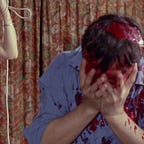Kiss of Death: A Progressive Film Noir
Richard Widmark creates one of the genre’s most memorable villains.
"Nick Bianco hadn't worked for a year. He had a record. A prison record. They say it shouldn't count against you, but when Nick tried to get a job, the same thing always happened. 'Very sorry. No prejudice, of course.' But no job, either."
It is a woman's voice that introduces the story of Nick Bianco (Victor Mature), a 29-year-old who has gone through a revolving door between street crime and prison his whole life. Having been marked as a felon for committing multiple armed robberies, he is unable to find a job. Backed into a corner, he keeps returning to a life of crime in order to put food on his family's table.
A clear message about the justice system is brought forward at the outset of Kiss of Death, one of the great classics of film noir, released by Twentieth Century-Fox in 1947. The screenplay was penned by Ben Hecht and Charles Lederer, from a novel by Eleazar Lipsky. Henry Hathaway, later of The Sons of Katie Elder and True Grit, was director.
Nick Bianco faces 15-20 years in Sing Sing for robbing a jewelry store on Christmas Eve. D.A. Louis DiAngelo (Brian Donlevy) offers him a chance for parole, out of sympathy for his wife and kids, if he'll "squeal" on his partners. Not trusting the authorities after being denied parole before, he refuses.
After a number of months in Sing Sing, hoping that his lawyer will secure his probation, Nick receives the news that his wife committed suicide, sticking her head in a gas oven. Suicide could be a little much in the '40s. At this point, Nick feels compelled to crawl back to the D.A. and "squeal" to him, so he can be with his two orphaned young daughters.
Underneath its tough noir exterior, at the heart of Kiss of Death is a redemption story. A convicted felon tries to turn his life around and make a better life for himself and his family, but he constantly finds himself trapped in the same vicious cycle, a prevalent theme in film noir.
With DiAngelo, he seems to have found his escape. The D.A. gives him a chance at a new life, if Nick will cooperate in getting him the convictions he wants. This includes testifying in court against a notorious thug named Tommy Udo, at the risk of damaging his reputation in his neighborhood, and becoming the target of a hit. All the while, romance blossoms between him and young Nettie (Coleen Gray), who used to babysit his daughters. She is the narrator of the story.
Tommy Udo becomes a bigger player in the story the more it progresses, and he proves to be one of the all-time great villains in film noir. He is played by Richard Widmark, in his debut film role, aged 32. His smarmy, nasally voice, shit-eating grin, and demented laugh would become iconic, along with one of the acts he commits in the film, one so monstrous that it would be cemented in the minds of audiences for years to come. That scene was so famous that it would be brought up by Dorothy Kilgallen during his appearance on What's My Line? seven years later.
Kiss of Death features a couple of other familiar faces. One of them is Detective Shelby, played by an uncredited Millard Mitchell. Fans of Singin' in the Rain will know him as the producer R.F. Simpson. Also appearing in one scene as Sgt. William Cullen is Karl Malden in an early role, aged 35.
The film has a considerable lack of music, which seems to be characteristic of a lot of Fox's noir pictures. Music is only used to score the occasional transitory scene, usually without dialogue. This may have been a cost-saving measure, but it enhances the film greatly. You get absorbed into the film's more tense sequences, without any overbearing orchestra telling you how to feel. In the final act, you'll witness suspenseful scenes straight out of a home invasion thriller.
Needless to say as a classic noir film, the cinematography is excellent, photographed in beautiful black-and-white, with some nice framing, deep focus, and stark shadows.
Kiss of Death was a big success in 1947, and Richard Widmark would be honored with a Golden Globe for Most Promising Newcomer, and an Academy Award nomination for Best Supporting Actor. His performance as Tommy Udo would be imitated for years to come. I feel that Udo must have had an influence on Frank Gorshin when portraying The Riddler on the Batman TV series in the 1960s. Tommy Udo was to The Riddler what Gwynplaine was to The Joker.
Widmark would soon be typecast in several more villainous roles in the years following Kiss of Death, including as Jefty, the jealous admirer of Ida Lupino in Road House (not to be confused with roundhouse-kicking Patrick Swayze, or Ben Gazzara sending a monster truck through a car dealership), a role in which he even reprised his famous Udo laugh. However, Widmark would have a long acting career where he got to play a variety of different roles, including as Jim Bowie in The Alamo and Tad Lawson in Judgment at Nuremberg. He did like playing colonels a lot.
Kiss of Death can serve as an excellent gateway into the world of film noir. It has a lot of the atmosphere you'd want from the genre, while also offering a redemption arc for its criminal lead and a plea for reforming the system. It has held up remarkably well after nearly 80 years.
